Valuing Nature
By John Palka — Posted June 3, 2018
Nature’s Depths is dedicated to exploring the natural world, seeking to understand it to an ever greater degree, and cultivating a sense of being an integral part of it. In this post, however, I will explore not so much ways of understanding but rather ways of valuing. As we’ll see, understanding and valuing are closely intertwined.
IN THE BEGINNING
In the beginning, God created the Heavens
and the Earth,
And the Earth was without form, and void;
And darkness was upon the face of the deep.
And the spirit of God moved upon the face of the waters.
And God said, Let there be light; and there was light.
And God saw the light, that it was good:
and God divided the light from the darkness.
And God called the light Day, and the darkness He called Night.
And the evening and the morning were the first day.
With these stately words, familiar to most who were raised in the Judeo-Christian tradition, the writers of the Bible express their deepest understanding of the origin of the Cosmos, and—in subsequent verses—of the night sky, of the sun and the moon, of life here on Earth, and of the place of humankind in the Creation. It is a magnificent story, moving in a few lines from the universal to the intimate, and assuring us that it is all good.
The scientists of today have a grand story to tell as well, different from the Biblical story and founded not on revelation but on carefully formulated theory, measurement to an astonishing degree of precision, and repeated experimentation. The scientific story, too, moves from the cosmic to the intimate, and gives an account of the whole of creation and how its myriad manifestations are related one to another. Like the Biblical story, the modern scientific story tells about the place of humankind in the Cosmos, and of our strivings to understand that place.
Through Nature’s Depths I have tried to put forward this scientific story—that everything in the Cosmos shares a common heritage and that everything is interconnected, including us humans. We emerged out of the same formative processes that gave rise to other animals, to plants, and to assorted microbes here on our Earth. These same processes also gave rise to the planet itself, to the solar system, to our galaxy, to the rest of the Universe, and quite possibly to other forms of life beyond our Earth. In addition, our lives are intertwined with those of other organisms on Earth and totally dependent both on them and on the Sun. The energy of sunlight drives photosynthesis. Everything we eat is dependent on photosynthesis, as is the oxygen we require for life. Our digestion and the decomposition of our wastes are dependent on a variety microbes. The list of interdependencies that we know about is very long, and new ones are uncovered every year.
ANCIENT UNDERSTANDINGS
This profound understanding of common origins and ongoing interconnections and interdependencies is relatively new. It is not, for example, the Biblical view. In those grand opening words, the writers of the Bible did not tell us that the Heavens and the Earth and the plants and animals evolved by means of the operation of natural processes. Rather, the Creation was described as the product of the will of God.
Modern scientists who are also devout Christians—for example, Francis Collins, former director of the Human Genome Project and current director of the National Institutes of Health, and John Polkinghorne, once a distinguished quantum physicist at Oxford and now an Anglican priest—reinterpret the words of Genesis by considering that God set cosmic evolution into motion, created the physical principles that led the Universe to become ever more complex, and so forth. These scientist-philosophers make an eloquent case that modern science and Christianity are complementary rather than in conflict. Complementary yes, but different.
Other ancient traditions have their own understandings of the Universe we know and of the human place in it. These ancient perspectives—eloquent, penetrating, and personally enriching as they may be—do not directly address the central, modern concepts of evolution, interconnectedness, and interdependence. How could they? Prior to the advent of modern science, the information on which these newer perspectives are based was not available.
And yet, and yet . . . ! Many ancient texts that deal with the natural world express wonder, awe, and gratitude for the world around us even as we understand that world today. Take the famous prayer of St. Francis, the Canticle to the Sun. Addressing God, St. Francis proclaims:
. . . . .
We praise You, Lord, for all Your creatures,
especially for Brother Sun,
who is the day through whom You give us light.
. . . . .
We praise You, Lord, for Sister Moon and the stars,
in the heavens you have made them bright, precious and fair.
. . . . .
We praise You, Lord, for Sister Water,
so useful, humble, precious and pure.
. . . . .
We praise You, Lord, for Sister Earth,
Who sustains us
With her fruits, colored flowers, and herbs.
In verse after verse, St. Francis pours out his gratitude for the world we live in, not excepting death.
We praise You, Lord, for Sister Death,
from whom no-one living can escape.
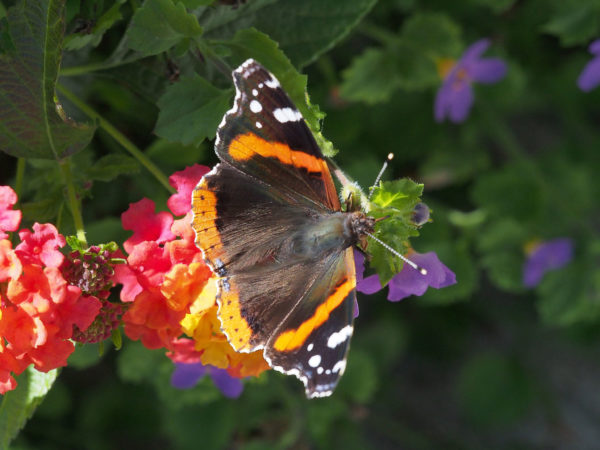
Fruits, colored flowers, herbs – and butterflies. A red admiral perches on lantana in our garden, Whidbey Island, Washington.
It is a magnificent view, embracing much of what we know today and reveling in it. It is no scientific treatise. Knowing it by heart would not help you answer the questions on an exam in your biology course. And yet, knowing it in your heart would, I believe, bring you to a richer understanding and appreciation of our Cosmos, our Earth, and ourselves—the very understanding that stems from science. Billy Collins, poet-laureate of the United States from 2001 to 2003, shows us just this in his poem “As If to Demonstrate an Eclipse”:
I pick an orange from a wicker basket
and place it on the table
to represent the sun.
Then down at the other end
a blue and white marble
becomes the earth
and nearby I lay the little moon of an aspirin.
I get a glass from a cabinet,
open a bottle of wine,
then I sit in a ladder-back chair,
a benevolent god presiding
over a miniature creation myth,
and I begin to sing
a homemade canticle of thanks
for this perfect little arrangement,
for not making the earth too hot or cold
not making it spin too fast or slow
so that the grove of orange trees
and the owl become possible,
not to mention the rolling wave,
the play of clouds, geese in flight,
and the Z of lightning on a dark lake.
Then I fill my glass again
and give thanks for the trout,
the oak, and the yellow feather,
singing the room full of shadows,
as sun and earth and moon
circle one another in their impeccable orbits
and I get more and more cockeyed with gratitude.
Isn’t it amazing when scientific understanding is blended with deep appreciation? I, for one, am increasingly finding that each enriches the other!
INTRINSIC AND INSTRUMENTAL VALUE
For St. Francis and Billy Collins, as for many of us, the natural world has intrinsic value. It is something magnificent for which we are grateful. This sense of nature’s value stands in sharp contrast to the concept of instrumental value, the idea that nature has value only to the extent that it serves the physical needs of humanity.
An example of the philosophy of instrumental value in action is the concept of water rights. Water is a precious commodity and a limiting resource. In the United States, the right to draw water from natural sources is regulated by an assortment of laws that assign water rights, rights that can actually be inherited or sold. Typically, water rights are based on historical usage, land ownership, or the need of municipalities to supply their citizens with clean water. There is rarely anything in the laws that takes into account the needs of the fish, or of the vegetation alongside a body of water or a stream, or of the birds and insects that depend on the vegetation. And there is nothing in the water laws that in any way assigns inherent value to water, nothing that might echo the sentiments of St. Francis:
We praise You, Lord, for Sister Water,
so useful, humble, precious and pure.
Useful to us, of course, but also with her own attributes—humble, precious, pure, and created by God just as we have been.
If we felt the same relationship to our Earth as St. Francis did, would we heedlessly dump sewage and toxic chemicals into the waters as we used to do? Or withdraw so much water that we kill the fish, as we often do even today? I think not. If we took seriously the modern concept of inherent value, or alternatively the ancient concept that our Universe is the creation of the same God who also made us, we would probably make different decisions than we do today about the use not only of water but of natural resources more generally.
INFLUENCING NATURE
In Nature’s Depths I have emphasized that we humans depend on the natural world and are as integral a part of it as is any other organism. There is another aspect to the human place on Earth, however. We not only depend on nature and are a part of nature, we also profoundly influence the natural world of which we are a part. There is no part of this world that we have not impacted, increasingly so since the massive growth of human populations and the power unleashed by the Industrial Revolution.
Some of these impacts are not easily seen by us. The prairies of the Great Plains, for example, were regularly burned by the Native American tribes who lived there. If prairies are not burned, the forest quickly encroaches and the grassland disappears. Grazing cattle play a similar role in maintaining the beautiful alpine meadows in Switzerland, Austria, and other mountainous countries of Europe. Even the vast forests of the Amazon basin show clearly that they have been the site of human farming for millennia. The impact that we humans are having on the planet today may be greater than ever before, but the fact of human impact has a very long history.
My understanding of wild nature was deeply challenged when I first read the book Uncommon Ground: Toward Reinventing Nature, written by the environmental historian William Cronon in 1995. Cronon makes two fundamental points. First, he articulates the empirical observation that we have just seen—we humans have affected virtually every nook and cranny of planet Earth and have been doing so for literally thousands of years. Second, he emphasized that the idea of wilderness as something to be treasured, protected, and left alone is a new one. Until the 19th century, at least in the Western world, wilderness was largely regarded as a region to be transformed into something directly useful to us humans, as a threatening area to which an offender could be banished, or simply as territory to be crossed carefully on the way to some other place.
With the ecstatic response of white adventurers to the great American West, the modern idea of wilderness as something precious was born. This idea was later embodied in the famous words of the U. S. Wilderness Act of 1964:
A wilderness, in contrast with those areas where man and his own works dominate the landscape, is hereby recognized as an area where the earth and its community of life are untrammeled by man, where man himself is a visitor who does not remain.
Philosophically, the Wilderness Act allocates to nature within a designated wilderness area both intrinsic value (“where the earth and its community are untrammeled by man”) and instrumental value (where “man is a visitor” who comes to enjoy the land and is usually glad to have trails to walk on). Wilderness is wild, but it is also managed.
Many other thinkers have examined these ideas. One recent example is Emma Marris, a nature writer living in Oregon. Marris is eloquent in emphasizing the value of nature that has not been set aside as wilderness—city parks, back yards, even neglected empty lots that have been colonized by weeds that draw pollinating insects and provide habitat for birds and garter snakes. In this, she echoes another message put forth by Bill Cronon.
SO WHAT ARE WE TO DO?
Are writers like Cronon and Marris saying that we should give up on the idea of wilderness? That we should simply accept that we are impacting the Earth and get on with our own lives? No, not at all. They are urging us to value all the nature that we have, wild or not, and to act with the greatest awareness of what we are doing. A passage near the end of Cronon’s introduction to Uncommon Ground has become a famous statement of this form of nature ethics:
“Learning to honor the wild—learning to remember and acknowledge the autonomy of the other—means striving for critical self-consciousness in all of our actions. It means that deep reflection and respect must accompany each act of use, and means too that we must always consider the possibility of non-use. It means looking at the part of nature we intend to turn toward our own ends and asking whether we can use it again and again and again—sustainably—without its being diminished in the process. It means never imagining that we can flee into a mythical wilderness to escape history and the obligation to take responsibility for our own actions that history inescapably entails. Most of all, it means practicing remembrance and gratitude, for thanksgiving is the simplest and most basic of ways for us to recollect the nature, the culture, and the history that have come together to make the world as we know it. If wildness can stop being (just) out there and start being (also) in here, if it can start being as humane as it is natural, then perhaps we can get on with the unending task of struggling to live rightly in the world—not just in the garden, not just in the wilderness, but in the home that encompasses them both.”
Learning to honor the wild. Living sustainably in our Earthly home. Practicing remembrance and gratitude. Surely St. Francis and Billy Collins would both agree!
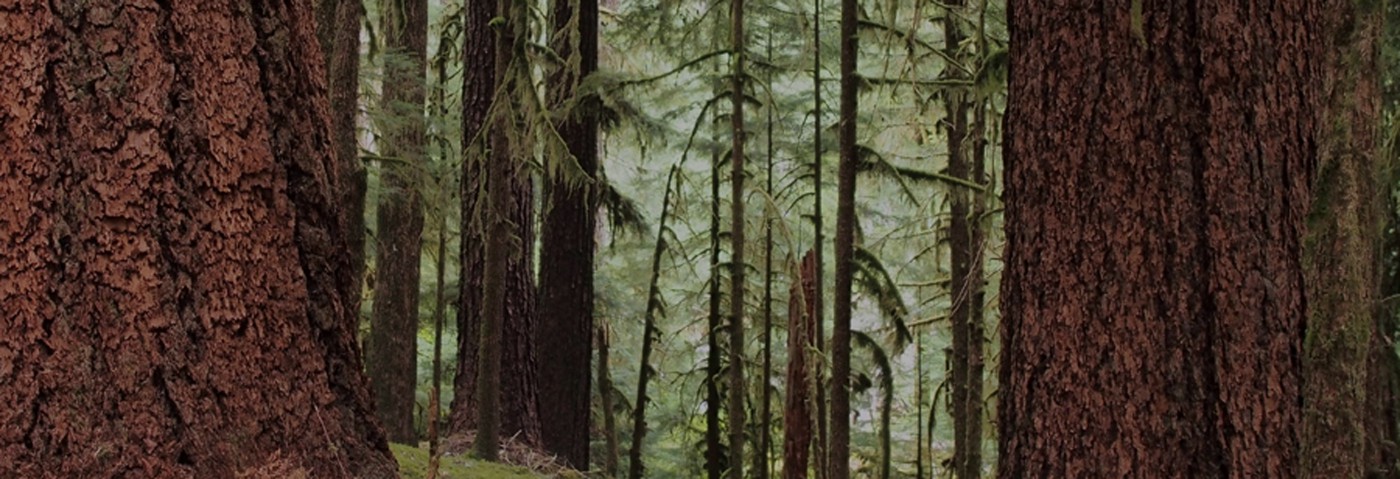
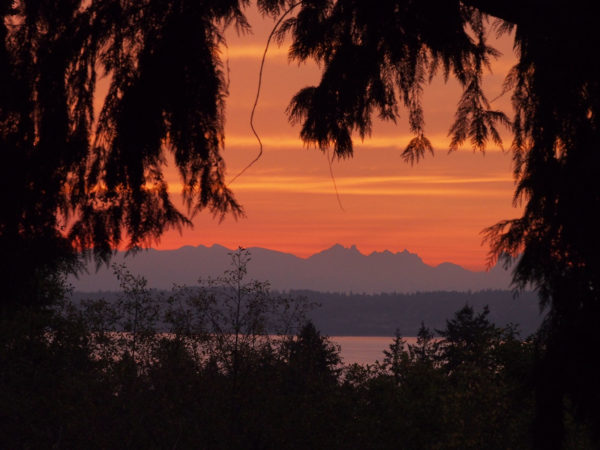
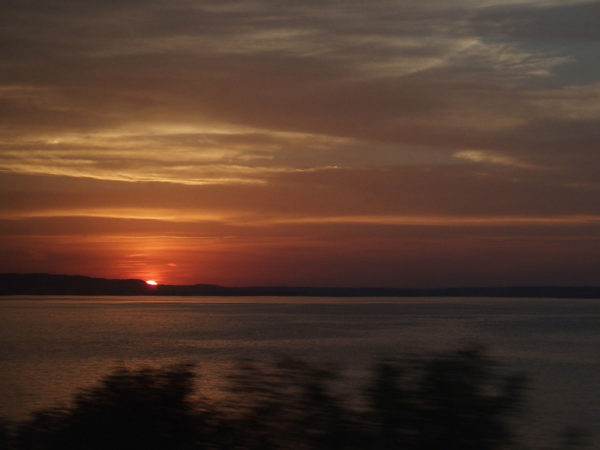
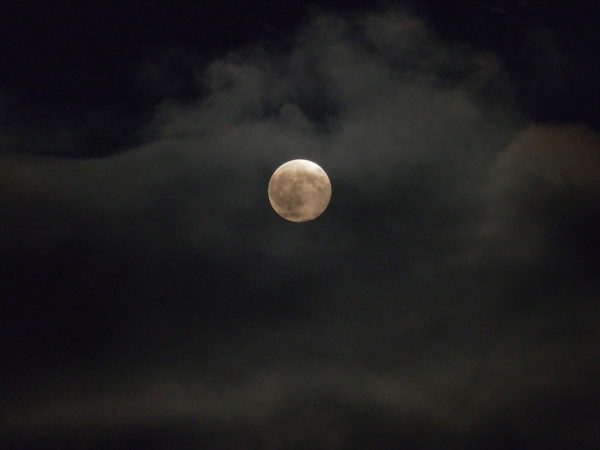
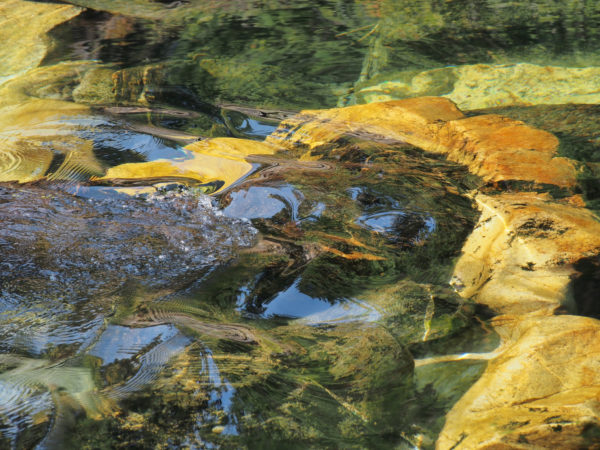
Thank you, Johnny. This was the first thing I found when I got up this morning and I read it as I listened to the owl in the nearby tree.
Isn’t it wonderful to realize how much we are given if we just take time to notice it?
Outstanding!
Thank you, Ursula. It’s been incubating for a long time!
A marvelous exposition Johnny..! Definitely to be re-read and reflected upon… Many thanks for your thoughtful compilation of sources – with some goodly ‘adds’ to my library of resources..!
Thanks, Marty!
Johnny,
What a sacred beginning to my day! We miss your dear presence on the trails at the WI. Your heart lives on in all I see in those forests.
With deep gratitude for the wisdom you bring to us through each posting and ‘sighting’.
Christie
Thanks so much, Christie. We’ll actually be back on the island for July and August. We’ll you then?
Lovely. You write about so much wisdom in such beautiful texts. Thank you!
I have found that there are many texts that nurture a deep relationship with and appreciation of nature and of our place in it. They are an inspiring complement to a scientific understanding. In fact, I can hardly think of a better example of meaningful mutual complementarity between perspectives!
BEAUTIFUL REFLECTION, Johnny. am going to share the link with my Theology and Ecology reading group at Roanoke College.
Thank you, Paul. I’m honored that you will share the link. If your members have an interest, please encourage them to get in touch with me.
A lot upon which to ruminate–many new examples for me. Thank you Johnny..
Thank you, Linda.
Hi, Johnny, Beautiful and thoughtful as usual! Would love to have coffee with you if we get a chance when you are back on the island!
Yes, by all means let’s not let a coffee date slip away!
Johnny, Wonderful essay by Timothy Egan in the NYTimes today that reminds me of your writing: (https://www.nytimes.com/2018/06/08/opinion/the-secret-life-and-value-of-trees.html?action=click&pgtype=Homepage&clickSource=story-heading&module=opinion-c-col-right-region®ion=opinion-c-col-right-region&WT.nav=opinion-c-col-right-region).
You really really need to put your essays together in a book!!
Thank you, Sue. As they say, “I’ll think on it!”
This is a lovely meditation, Johnny. In fact, I was just up in the North Cascades today high on the sides of the peaks of the Skykomish. The water crashing down from the melting snow above is a treasured reminder of how clean and pure some parts of the earth can still be. So good to read your reflections now before I go to sleep to dream.
Thank you, Larry. I am so looking forward to the Northwestern mountains. I have ambitions of hiking up to Cascade Pass again, in preparation for doing it next year to celebrate by 80th birthday!